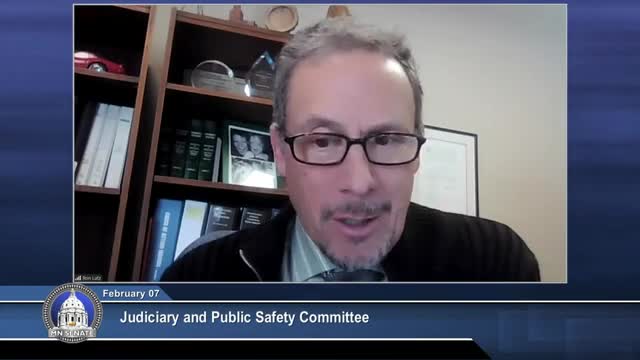Minn. Human Rights commissioner briefs Senate Judiciary on investigations, equal-pay portal and consent decree monitoring
Get AI-powered insights, summaries, and transcripts
Subscribe
Summary
Commissioner Rebecca Lucero of the Minnesota Department of Human Rights told the Senate Judiciary and Public Safety Committee on Feb. 7 that the agency is advancing an online portal for workforce and equal‑pay certificates, continuing court-ordered monitoring of a consent decree with Minneapolis, and managing a marked increase in discrimination charges filed by Minnesotans.
ST. PAUL, Minn. — Commissioner Rebecca Lucero of the Minnesota Department of Human Rights told the Senate Judiciary and Public Safety Committee on Feb. 7 that the agency is advancing an online portal for workforce and equal-pay certificates, continuing court-ordered monitoring of a consent decree with the City of Minneapolis and Minneapolis Police Department, and managing a marked increase in discrimination charges filed by Minnesotans.
The presentation to the committee focused on the agency’s two core duties under state law: neutral fact‑finding investigations and administration of workforce and equal‑pay certification requirements for state contractors. Lucero also outlined the department’s modest budget request for the 2026 biennium, described as “a little bit over a 2% increase” from the adjusted base.
The portal for workforce and equal‑pay certificates — documents contractors must provide when contracting with state agencies — has been in development to reduce duplicate data entry and streamline compliance. Lucero said testing with vendors is planned for the summer and the agency aims to launch the system “by fully by the end of the year.”
The department’s enforcement work spans employment, housing, education and public accommodations under the Minnesota Human Rights Act. Lucero cited the state’s long history of civil‑rights laws dating to the Minnesota Constitution (May 11, 1858) and the 1885 public accommodation law, noting Minnesota in 1993 became the first state to prohibit discrimination on the basis of sexual orientation and gender identity. She described the agency’s investigatory duties as a neutral fact‑finding process under Minnesota Statutes chapter 363A: people submit a charge online at www.mn.gov/mdhr, the agency screens jurisdiction, offers mediation and may issue a probable‑cause or no‑probable‑cause finding after investigation.
Lucero said the department has seen a recent surge in filings: “we have had a 43% increase in the total number of charges that Minnesotans have filed,” and that filings now come from roughly “82 or 83 counties.” She told senators inventory levels have remained “relatively consistent” because staff are working to move cases efficiently.
The commissioner highlighted the department’s mediation program as an effective alternative dispute resolution tool, saying it often shortens the process and can save money for businesses, landlords and schools. Committee members praised mediation during the discussion. Senator (unnamed) described mediation as offering “an opportunity for each party to speak” confidentially and to seek acknowledgment or apology outside adversarial proceedings.
Lucero reviewed prominent case work, including a consent decree with the City of Minneapolis and the Minneapolis Police Department approved in state court on July 13, 2023, following the department’s investigation after George Floyd’s murder. She said department monitors remain active in the city implementing policy changes. Lucero also told the committee that the federal Department of Justice had ordered an immediate halt to its parallel civil‑rights work and indicated it may not proceed with its consent decree; she said the state consent‑decree work has continued despite federal developments.
The commissioner summarized recurring complaint types and enforcement outcomes: disability remains the most common basis for charges, and other frequent bases include race and sexual‑orientation or gender‑identity claims. She recounted examples of probable‑cause findings announced by the department, including a consent decree with a McDonald’s franchise after a criminal sexual‑assault investigation involving a minor and actions to require policy changes and reporting mechanisms.
On school scheduling conflicts with religious holidays, Senator Carlson asked whether such disputes would fall under the Minnesota Human Rights Act. Lucero declined to comment on any specific pending case because of data‑practice rules but urged proactive scheduling and accommodations and said that individuals who believe they have experienced discrimination at schools may contact the department for screening and, if appropriate, a neutral investigation.
Committee members asked about backlog and timeliness. Lucero said the agency is largely funded from the general fund, that roughly 90% of expenses are payroll, rent and IT, and that the current budget request is a modest operating adjustment aimed at maintaining staff capacity. No formal committee action or vote occurred during the hearing.
The meeting lasted about 40 minutes; senators thanked the commissioner and the committee adjourned. Lucero noted two department senior staff — Nico Bauer, government relations director, and Sarah Weiss, public policy and outreach director — were available to follow up while she prepares for a brief parental leave.
